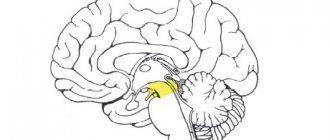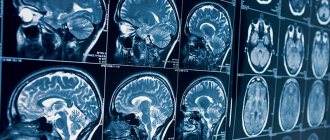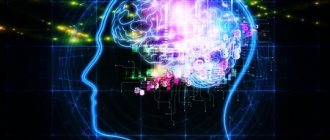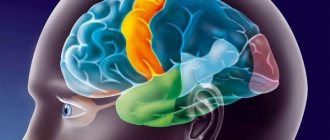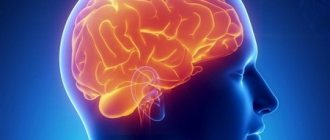Thanks to many years of studying our insides at every opportunity, scientists have a good understanding of how almost every part of our body works. However, the most mysterious part of our body is the brain. And the more we study it, the more mysterious it becomes. You can’t even imagine what amazing things our “thinking machine” is capable of. Don’t worry, scientists didn’t know this for a long time either.
Superhero brain.
Today we will talk about 10 of the most incredible capabilities of our brain that make us almost superheroes.
The brain can create false memories
Fool me.
Here's a scientific fact: our brains are capable of creating fake memories. Have you ever found yourself in a situation where you remember something even though it never actually happened? No, we are not talking about memories of past lives where you were Caesar or Cleopatra. What we're talking about is that you "remember" doing things that you didn't actually do. They thought they borrowed money from a neighbor, but in fact they didn’t. They thought that they bought some thing, but in fact they did not buy it. There are a lot of such examples.
There are also more impressive ones. For example, our brain may convince us that we have committed a crime. In one experiment, scientists were able to instill and create false memories in 70 percent of participants. They began to think that they had committed a theft or an armed attack.
How it works? It is believed that our brains may fill in gaps in our memory with inaccurate or completely unreliable information when we try to remember something.
Also interesting to read: Bad smells make memories stronger
Unique properties of the human brain
Intensive brain formation occurs at a young age, from 2 to 11 years. To fully utilize the capabilities of the human brain, new, strong neural connections are required. There are no strong connections in the children's brain yet. Their formation occurs during learning, cognition and acquaintance with the world. A typical method of memorization for this age is the use of eidetic memory, thanks to which children more easily learn a lot of new material. In adults this ability is extremely rare.
The unique characteristics of the human brain are supported by facts:
1. The organ works without breaks, without days off, even during sleep its high activity is observed.
2. The organ does not get tired from work - research has proven it. The blood of an intellectually busy person remains unchanged at the end of the working day.
3. The brain reacts the same to thoughts, whether they are inspired by fantasy or imagination.
4. The brain can store some situations for a long time and others for a short time.
5. Most of the processes are controlled by the subconscious. The subconscious is activated in order to avoid overload, bypassing consciousness.
6. The speed of thought outstrips the speed of light, which muscles cannot keep up with. Bad handwriting is proof of this.
7. The brain wakes up a little later than the body. A person who has just woken up needs exercise (physical) and for the mind.
8. Thanks to mental exercises, the volume of neurons increases and their connections improve. These exercises slow down aging and prevent Alzheimer's disease.
9. Thoughts that often appear turn into reality. Therefore, if you want to change something, you should change your own thinking.
10. Compensation is the ability of an organ to use, for example, the part that is injured.
11. Relieve brain tension through prayer or meditation.
Scientists have discovered the brain's ability to change physically. Such manipulations take place over a long period of time. Transformation depends on attitudes, on what a person thinks.
The human brain has incredible potential that has not yet been explored. For a long time it was believed that neurons do not renew themselves, but only die. The opinion changed after the discovery made by Elizabeth Good. She found that neurons can grow and also renew themselves at any time in life.
Conclusion. Training your mind can unlock a new secret of opportunity.
Should we develop mental abilities?
Is it possible for any person to unleash the abilities of the mind, for example, to solve complex problems? You can learn a lot if you apply effort and consistency in training.
Study even after graduating from school or college? I unlearned it and that’s it. But no. The brain requires constant work, otherwise it degrades. By the way, only 0.3% of the total population are some kind of genius people. The vast majority of humanity is engaged in routine and they are happy with their situation. The main thing is that a person should feel comfortable.
Our brain can predict the future
Agility.
It has been found that there is a delay when visual information enters our brain, allowing us to predict what is going to happen next. These predictions are based, among other things, on our past experience (a ball is flying at us - we need to dodge; an open road hatch - we need to go around). We don't even connect our consciousness to it (in other words, we don't think about it). All people are able to predict the future, which helps us avoid those things that can harm us.
Is it possible to learn superpowers?
Not only scientists, doctors and “ordinary” people are also interested in the capabilities of the human brain - a documentary film from the BBC, Discovery, stories from other TV channels and film crews invariably find viewers.
All kinds of trainings aimed at developing personality or some of its aspects are also becoming more and more popular. Quite unconventional and unauthorized by official science educational materials from Vyacheslav Bronnikov or Mirzakarim Norbekov are no exception.
Various methods from the realm of practical psychology are extremely popular. For example, a project that also develops the capabilities of the human brain is “5 Spheres”. Here, in contrast to, for example, Bronnikov’s method, we are talking about completely traditional advice that fits into the theories of modern psychology.
It is quite possible that further research by scientists will prove the reality of alternative vision, and the ability to cure one’s own diseases without modern medical technologies, with a simple effort of will, and other possibilities that are still considered supernatural. One thing is clear - many interesting discoveries await us in the future.
Our brain “sees” 360 degrees
The brain can see better than the eyes.
And this opportunity makes us like Spider-Man. Yes, we, or rather our brain, are capable of very carefully monitoring our surroundings and reporting what we have not yet fully realized. For example, we begin to feel that someone is watching us. A feeling of awkwardness appears, we begin to sweat, and the skin becomes covered with goosebumps. We turn our heads in this direction, and we actually see that some person is looking at us. Some people call it the “sixth sense.”
We don’t have eyes on the back of our heads, and our field of vision is quite narrow compared to other animals. But the brain doesn’t need them there. It has a more effective means of assessing the environment. For example, hearing, which is capable of noticing even the most minor changes in the surrounding background. And this ability is especially enhanced when we cannot see part of this environment.
Unleash your capabilities
Our brain is a unique creation of nature. It contains about 100 billion nerve cells (neurons). Neurons form incredibly complex neural networks—trillion to quadrillion connections—called “synapses.” From each neuron there are processes called axons and dendrites that send chemical and electrical signals through the spaces between the synapses.
The adult human brain has more than 100,000 miles of axons, enough to circle the Earth more than four times. Behind the creation of this perfect mechanism, the “three-foot Universe,” as some scientists call the brain, there are millions of years of evolution from the simplest organisms to Einstein’s brain.
Do we control the brain or does it control us?
The whole world with its colors, sounds, tastes would not have any properties for a person if it were not interpreted by his brain. The brain literally creates the world around us exclusively for us - one and only, unlike the worlds of other people. But is it only the brain that creates for us our individual picture of the world, or do we (or rather, our psyche) also play a role in this creation?
The “we” option opens up unlimited possibilities for creativity and control of your brain. Of course, genes and physiology play a role, but they too can improve, just like our brains.
All sensations in our tactile world are created through the interaction of the psyche and the brain. We are like antennas, transforming billions of bits of incoming information into our own colorful world. Become a leader of your brain and it will become a perfect brain, because it will have an aware creator and an experienced user, not a slave performer.
New attitude. How does the psyche relate to the brain?
The anatomy of the brain is not so important - after all, Einstein’s brain was no larger than the brain of an ordinary person, but even 10 percent smaller. What is important is the conceptually different interaction between the psyche and the brain, characteristic of a perfect brain. Scientists know that connections not used by the brain are not preserved or developed, but atrophy.
Only those neural connections that are involved in acquiring new knowledge remain and are improved. This means that the brain simply needs constant stimulation from our psyche. The brain is not afraid of new and complex tasks; the more they arise, the more your brain is capable of.
There are several important points regarding the relationship between the brain and the psyche:
- There is always feedback between the brain and the psyche, the circuits of which are intelligent and adaptable. Our intentions force our brains to develop and change. For example, Tibetan monks can use meditation to warm the body in cold weather and even physically change the frontal cortex of their brain. It is not their brain that does this, but their intentions. Remember - the brain is always listening to our thoughts and adopting our attitudes. The brain can only do what we consider ourselves capable of - nothing more!
- Consciousness comes from the psyche, and is not born from the physiology of the brain.
- Self-awareness forces us to develop and conquer the unknown. We can conditionally divide the unconscious (emotions - anger), conscious (thought - “I’m angry”) and self-consciousness (“I’m angry for a certain reason, and my anger in the past ended badly for me”). As soon as you bring self-awareness into play, your picture of the world changes - you become the leader in your relationship with the brain, you can change your behavior and your reality.
Our brain can accurately assess any person in a split second
Creativity is not for everyone.
The brain has a very good sense.
No matter how unbiased we try to seem to ourselves, our brain has its own idea on this question. He is able to evaluate the person you meet for the first time in just 0.1 seconds (how he looks, how he speaks, how he is dressed, shaved, and so on). While we are trying to consciously understand all this, our brain on a subconscious level is already creating a picture of a person (and a fairly accurate one at that) and drawing a conclusion whether you will like this person or not.
Efficiency potential - errors
According to Caroline Notebaert, the strength of our brain is its potential minus its mistakes. In other words, everyone has potential, which can be attributed to talent as well as experience, knowledge and acquired skills. Simply put, anything you can consider to be your strengths.
He is 13 years younger than her: what does Alena Khmelnitskaya’s common-law husband do?
A broken wedding and a new attempt. Will Yulia Karaulova get married?
Drake's plane costs 200 million. How much did the stars pay for comfort?
To understand why we sometimes become “worried” about our capabilities and cannot fully use them, Caroline Notebaert gives the following example. A gifted singer takes the stage and suddenly finds himself so enslaved that he loses his hearing. The potential is there, but the disorder (and in most cases it is an internal disorder) has made it unable to develop. From a neuroscience perspective, Caroline Notebaert wanted to find out how we can prevent such disorders from occurring. And it really is possible.
Our brain is the perfect alarm clock
The brain will wake itself up better than any smartphone.
“I don't need an alarm clock. “I am my own alarm clock,” some people say. Know that they are not joking. If you keep a routine (go to bed and get up at the same time), your brain gets used to it. Our own biological clock is better than any alarm clock. Therefore, many people may wake up before the dreaded bell rings, signaling that it’s time to get up for work. This is often observed, for example, among office workers.
Ways to Rewire Your Brain Using Neuroplasticity
Neuroscientists know many ways to stimulate neuroplasticity in the brain. Let's name a few of them, the most famous:
1. Intermittent fasting.
Increases synaptic adaptation, promotes neuronal growth, improves overall cognitive function and reduces the risk of neurodegenerative diseases.
2. Travel.
Expose your brain to new stimuli and new environments, opening up new pathways and activity in the brain.
3. Use of mnemonic devices
– memory training (learning a new language, crosswords and sudoku, etc.). May improve connectivity in the prefrontal parietal network and prevent some age-related memory loss.
4. Learning a musical instrument
. May increase connectivity between brain areas and help form new neural networks.
5. Non-dominant arm exercises,
to eat or brush your teeth. They can form new neural pathways and strengthen connections between neurons. You can move the “mouse” to the other side of the keyboard, learn to juggle, sleep on the other side of the bed, change your route to work, etc.
6. Reading fiction
. Increases and strengthens connections in the brain.
7. Expansion of vocabulary.
Activates visual and auditory processes, as well as memory processing. Be sociable. Talk to people, make new friends. Higher social engagement is associated with higher cognitive functioning.
8. Creating artwork
Improves resting-state brain connectivity (the "default mode network"), which can enhance introspection, memory, empathy, attention and focus
9. Light to moderate regular exercise.
Are fertilizer for your
10. Meditation, yoga.
With meditation, your brain is effectively rewired, transformed, making this way of thinking more standard. The more your brain changes from meditation, the more you respond to everyday life with a feeling of calm, peace, and focus throughout the day.
11. Dancing.
Reduce the risk of developing Alzheimer's disease and increase neural connectivity.
12. Sleep.
Stimulates learning retention through the growth of dendritic spines, which act as connections between neurons and help transmit information between cells.
So neuroplasticity
makes your brain extremely elastic. Therefore, you can rewire, encourage, and stimulate your brain to adapt to new circumstances. You can increase your learning ability, improve your memory, and expand your cognitive abilities by creating new connections between neurons using the brain reprogramming methods outlined in this article.
In addition, neuroplasticity
allows people to recover from stroke, brain injury and congenital brain abnormalities, reduce the symptoms of autism, break free from depression and addiction, and get rid of other obsessive-compulsive disorders.
Good luck and perseverance in reprogramming your brain!
Our brains can “listen” and learn while we sleep
Would you like to study in your sleep?
We are used to thinking that during sleep our brain completely switches off. Actually this is not true. Yes, some parts of the brain really rest, reducing their activity. But, we can even learn in our sleep! During the so-called REM sleep phase, a person is able to remember certain things. During experiments, scientists played certain sound signals (which people had never heard before) in front of sleeping people. Then the people woke up, and the researchers played the signals again and asked them to say which of the sounds sounded familiar. And people recognized them!
It's a cool ability, but we don't recommend using it for homework, tests, or important presentations.
Also interesting: Electrical brain stimulation temporarily rejuvenates the human brain by 50 years
Tsiperovich phenomenon
However, the cases mentioned are not the most surprising. There is a phenomenon that demonstrates even more amazing capabilities of the human brain - the Tseperovich phenomenon. Yakov Tseperovich is a man who has not slept for more than thirty years, eats little and does not age at all. Time seemed to have stopped for him - he still looks the same as in the photographs of the 70s.
The story of this man began in 1979 - after severe poisoning, he was in a state of clinical death, after which he fell into a coma. Coming out of it a week later, Yakov discovered that he could not sleep - he could not even lie horizontally. Doctors could neither explain nor change this condition - only a few years later, after taking up yoga and meditation, Tseperovich learned to briefly take a horizontal position, but not for sleep, but for half-asleep.
Before that incident, Yakov was an ordinary person - he loved to fight, drink, and worked as an electrician. Afterwards I began to become interested in Eastern practices and developed my own system of exercises. Recently he lives in Germany.
The brain can learn through imagination
Creativity is not for everyone.
A simple experiment first performed more than 100 years ago. People were divided into two groups. One group was taught basic piano skills using the instrument. The other group was taught without a piano. People were simply told how to place and move their fingers correctly, and also described how a particular note sounds. By the end of the training, it was determined that both groups had the same skills - both were able to play the tune they were taught on the piano.
In the 1990s, using more modern scientific tools, scientists actually discovered that imaginary learning and practice can have the same effects on the brain as real ones.
Are the possibilities of the brain limitless?
Woe from Wit is a Literary Fiction
Would you agree to live forever if your life continued in an irrational state?
Sergey Savelyev:
Of course not. It is not interesting. Although some people are born and die without regaining consciousness, as was written in the anamnesis of one of the general secretaries of the Communist Party. He lived and died without regaining consciousness. Of course this is a joke. But there are plants that live for thousands of years. Ask them, they probably like it. As far as human evolution is concerned, it is nothing more than the evolution of the brain and nothing more. Because in everything else we are made to be worthless. As the famous ophthalmologist Helmholtz said, if the Lord God had instructed me to make eyes, I would have made them a hundred times better. This also applies to all other human organs.
What is grief from the mind in the physiological manifestation of this, let’s say, illness?
Sergey Savelyev:
Grief from the mind as the average person interprets it or in the sense that the great Russian writer put into this concept - such grief does not exist. If a person is smart enough, then he understands the principles and mechanisms of the world in which he lives, and will not, like Chatsky, “throw pearls before swine.” Woe from Wit is a literary fiction. A person who understands what is happening, firstly, does not place unduly high demands on others, and, secondly, uses his knowledge shamelessly.
Okay, I’ll ask this: can excessive stress on the brain have negative consequences for a person?
Sergey Savelyev:
There is a naive opinion that the human brain is limitless in its physiological capabilities. In fact, he is very limited in them. There are clear physiological limits. Metabolic speed cannot be increased indefinitely. When a person is not mentally active, that is, when, for example, he reads the Rossiyskaya Gazeta on the couch before going to bed, he consumes approximately nine percent of the body’s total energy. And if reading somehow excites and warms him up, acts like pepper in food, then he begins to think, and energy expenditure in this case reaches twenty-five percent of the total energy of the body. This is a very big expense and very difficult. The human body resists them. That's why we are lazy and incurious. Meanwhile, creativity requires exactly that twenty-five percent.
In the brain, everything is arranged in such a way that the entrance is a ruble, the exit is three
So, for the sake of health, you need to save mental energy?
Sergey Savelyev:
This happens against our will. The human brain is not adapted to high energy expenditures. In twenty-five percent activity mode, it can last a couple of weeks. And then the so-called energy debt and what in old medicine was called nervous exhaustion begin to develop. In the brain, everything is arranged in such a way that the entrance is a ruble, the exit is three. If you are mentally overstrained for two weeks in a row, then you should relax and rest for six weeks to compensate for brain costs.
Are you saying that intellectual stress harms the brain?
Sergey Savelyev:
Of course, they do harm; he is not suited for intelligence.
I thought you would say that intellectual exercise strengthens the brain, just as physical exercise strengthens the muscles.
Sergey Savelyev:
But nothing like that happens to the muscles either. They do not strengthen from physical activity, but are destroyed. How long do you want to live? If you want to live as a strong, handsome athlete until you are fifty, then, of course, strengthen your muscles. But any muscle can contract one billion times and then it dies. Any overload is death. This applies to both muscles and brain. The mortality rate for professional athletes is ten times higher than for ordinary people. And from serious illnesses. Sports are not useful.
Is light load on the brain beneficial?
Sergey Savelyev:
Oh, this is the dream of any sovereign.
Doesn't brain passivity lead to mental degradation?
Sergey Savelyev:
The world is filled with mystical stories about the brain, but the essence is simple: the brain does not want to work, because its work requires energy. This is the reason for our idleness, laziness and desire to steal rather than earn.
You can never explain why one person sees something that another doesn’t see.
There are people who have phenomenal abilities. For example, the ability to multiply two four-digit numbers in your head in a few seconds. Is there a scientific explanation for this?
Sergey Savelyev:
You need to study at a physics and mathematics school to master this skill. It's not difficult, there are well-known techniques. Well, besides, you have to be limited in many other areas in order to demonstrate such tricks with concentration. There is nothing creative or even more ingenious here. There are stories of people who have been amazing at multiplying numbers, especially when it comes to their own money. But, unfortunately, these people did not make anything other than such calculations.
Are there parts of the human brain that are responsible for a particular talent, for example, music or chess?
Sergey Savelyev:
Of course have. The entire surface of the brain is occupied by areas that are structurally very well identified. You can look at histological sections. In these histological sections several microns thick, if you cut into the human brain, there are fields and their boundaries are visible. Each field is functionally adapted to a particular function. Let's say, to vision, hearing, movement. And the brain consists of such fields. And it is individually variable. That is, each field is different for different people. For one person, for example, a good photographer, it in the “visual” area can be three times greater than for anyone else. And these are billions of neurons, billions of connections. You can never explain why one person sees what another does not see. The same is true for a musician or a scientist. Our individual capabilities are determined by the combination of these fields, which have different sizes. Anyone who has a large field has one or another talent that is clearly expressed. And whoever has a small field, for example, in mathematics, will not be able to increase his abilities in any way. In a word, our behavior is determined by the size of the fields of the cerebral cortex, as well as the subcortical structures that are responsible for each function. For example, for music. To simply hear, you need to have two dozen structures. The likelihood that one person will have all these structures large enough is, frankly speaking, small. Therefore, there are few outstanding musicians, and there are plenty of imitators.
Mind is an abstract concept
How are the brain and mind related?
Sergey Savelyev:
Mind is an abstract concept. Is it intelligence that a worm consciously crawls from a salt solution to a food solution? From the point of view of psychologists - yes. But physiology does not operate with abstract concepts. Genius - yes, there is such a concept in physiology. A unique combination of the size of brain structures allows a person to write brilliant music. And another will never write brilliant music, because he does not have the appropriate combination of structures. The brain is a structurally determined device that determines the individuality and uniqueness of each person. For this reason, everyone is different. And these abilities are not inherited. Compared to a talented parent, a child may look like a complete mediocrity. Which is what happens most often.
Can we say that the mind is a mediator between the brain and the body?
Sergey Savelyev:
No. Reason is not a scientific concept at all. What is the reason? Pointing your finger at the computer keyboard? Press phone buttons? Count to ten?
Nevertheless, there is a concept of “intelligent beings”.
Sergey Savelyev:
I don't do philosophy.
In any case, intelligence is a physiological concept.
Sergey Savelyev:
For me, such a concept does not exist for the simple reason that its boundaries are blurred. All animals that have a nervous system have intelligence. And in this sense, it is stupid to say that man is reasonable, and other living beings are unreasonable. Man is a product of cerebral evolution. He can create something that did not exist in nature and society. The ants cannot create what did not exist in society. And flatworms, and even monkeys, cannot create something that did not exist in their community. But a person can. What is the criterion of a person? The fact that he creatively creates something that has not been created before in nature and society. And if we agree that intelligence is the ability to create something that did not exist in nature and society, then I accept this concept. And if we don’t introduce this, then we get a vague empty definition, verbiage for philosophers, whose main task is to explain why we wasted our lives so mediocrely.
Europeans went through a negative evolution
Are there limits to brain development?
Sergey Savelyev:
Those who ask such questions assume that the human brain became conserved two hundred thousand years ago, and that no evolutionary changes have occurred since then.
Do they exist?
Sergey Savelyev:
Over two hundred thousand years, even a little less, about one hundred and thirty-five thousand, the human brain has decreased by two hundred and fifty grams. I mean civilized Europe. Because they selected conformists and destroyed creative, independent people.
Was brain evolution negative?
Sergey Savelyev:
For Europe - yes. Europeans went through negative evolution and high cerebral specialization - centuries-old artificial selection, very harsh, which reduced the size and mass of their brains in favor of conformity and social adaptation.
Are conformism and the ability to socially adapt unique to Europeans?
Sergey Savelyev:
Yes. Because they always lived very closely, and any order from any prince quickly reached everyone. Look, they are already cutting off the head of a peasant in a neighboring village... But in Africa it didn’t work well, and in Russia it didn’t work well, it didn’t work. Therefore, we have preserved more polymorphism, and Europeans have less. The greater the polymorphism, the greater the chance for evolutionary progress.
The human brain does not want to work, does not like it and, if possible, never will.
Do the limitless capabilities of the brain, if any, pose any risks for humanity?
Sergey Savelyev:
There are no limitless possibilities. Firstly, there are energy limitations. Secondly, the human brain is adapted to solve specific biological problems and strongly resists any inappropriate use. That’s why he doesn’t want to work, doesn’t like it and, if possible, never will.
So, laziness has a physiological basis?
Sergey Savelyev:
Certainly. When you are lazy and do nothing, your brain consumes nine percent of your energy. And when you start thinking - until twenty-five. And this is a disaster. Because when you are lazy, endorphins, these internal drugs, are released into the brain and as a result, not only are you idle, you also get a buzz. And when, God forbid, you start working, your brain comes up with a million ways to discourage you from doing so. As a result, the body resists and, anticipating energy costs, simply screams: “What will I do tomorrow?!” Where is the guarantee that the sausage will appear in the refrigerator again?!” That is, you resist any work like a normal monkey. And this is quite natural.
Can you make a lazy brain work?
Sergey Savelyev:
Can.
How?
Sergey Savelyev:
When you are put in a stressful situation that requires mental exertion. But at the first opportunity, your brain will deceive you. Even the brain of a genius, which is designed for creativity, will try to evade work. It is easier for a genius to imitate his genius than to create something. That is why geniuses have only one brilliant work out of twenty, the rest are fakes. The monkey breed is incorrigible; you have to hide your tail all the time.
You don't have to look for genius in politicians
Is the brain of a genius physically different from the brain of an ordinary person?
Sergey Savelyev:
Yes, the brain of a genius weighs more. At one time, the Brain Institute was created in Russia, where they studied, among other things, Lenin’s brain, comparing it with the brain of Mayakovsky and other outstanding people. It turned out that Lenin's brain was small and weighed 1330 grams. Stalin has about the same amount. What was, as we can now safely say, quite expected. In general, one should not look for genius in politicians. We have a biological, instinctive form of behavior called dominance. The inherent hyperdominance of politicians, meaning the desire to rule, control people and the course of history, is biologically determined. But genius is something else. This is the ability to do the unusual. Any baboon can become hyperdominant. Therefore, nothing special was found in Lenin’s brain; the parameters there were very mediocre. It’s just that this biological instinctive form of behavior - dominance - was hypertrophied in him.
The brain works even when we sleep
Is it true that no more than five percent of the human brain is used?
Sergey Savelyev:
Anyone who thinks so apparently uses it for two. This is complete nonsense about five percent. The whole brain is working. It’s like RAM in a computer: you turn it off and everything is erased. Therefore, six minutes after a person is disconnected from oxygen and food, the brain begins to irreversibly lose memory and die. It consumes ten percent of the body's total energy, even when we sleep. Precisely because it always works.
Intellectual exercise is the prevention of aging
What is brain aging? What causes senile dementia?
Sergey Savelyev:
Brain aging is primarily the death of neurons. It is very difficult to kill the neurons themselves. But their number is limited. Moreover, neurons in humans begin to die in the womb. After fifty years, they are already actively dying, and for every next ten years our brain loses thirty grams of neurons. This process continues until old age. And if you don’t think with your head, don’t force the blood vessels to supply blood and supply blood to the neurons, then by the age of eighty the brain can feel lighter by 100 grams, or even more. In people who do not use their brains at all, this kind of weakening occurs even faster. Intelligent people retain mental potency longer.
So, does the brain need intellectual stress?
Sergey Savelyev:
Absolutely. This is the prevention of aging. But with crossword puzzles and watching the TV program “What? Where? When?" You can't slow down brain aging. To slow it down, you need to solve a problem every time that you haven’t faced before. Playing chess can only speed up insanity, not stop it. Because chess is not such an intellectual activity. It's just combinatorics. Unfortunately, many people confuse creativity and combinatorics. Combinatorics is when three pieces of paper are made into a fourth, and the brain does the same.
Does evolution promise us mental progress?
Sergey Savelyev:
No, he doesn't promise. The prospects are sad: a decrease in brain size due to total conformism and constant adaptation to the environment, the export of one’s individuality and abilities to the state in exchange for saving energy. When we come to an agreement with the state or religion, we give them our creative, intellectual freedom. And they, in turn, guarantee us food and reproduction. So everything will get worse and worse. And if this trend continues, the human brain may shrink by another two hundred and fifty grams.
It turns out that evolution is going in the opposite direction? Is humanity not getting smarter, but getting stupid?
Sergey Savelyev:
Alas, this is true.
Business card
Photo: Alexander Korolkov / RG
Sergey Savelyev is a paleoneurologist, Doctor of Biological Sciences, head of the laboratory of development of the nervous system at the Institute of Human Morphology of the Russian Academy of Sciences. Born in Moscow, graduated from the Faculty of Biology and Chemistry of the Moscow State Medical University named after. Lenin, worked at the Brain Institute of the USSR Academy of Medical Sciences, and since 1984 at the Research Institute of Human Morphology of the Russian Academy of Medical Sciences. For more than 30 years he has been engaged in research in the field of brain morphology and evolution. Author of more than 10 monographs, 100 scientific articles and the world's first Stereoscopic Atlas of the Human Brain. For many years he has been studying embryonic pathologies of the nervous system and developing methods for their diagnosis. He is the author of the idea of cerebral sorting - a method of analyzing individual human abilities based on brain structures through the development and use of a high-resolution tomograph.
The photographer, a member of the Creative Union of Artists of Russia, was awarded bronze, silver and gold medals by the Russian Artists' Union.
Our brains are in "autopilot mode"
Have you ever felt like you were on autopilot?
As soon as we master a skill well, our brain connects a certain department to work, the so-called passive mode network. It is used to perform tasks that do not require complex analysis, since their solution has already been tested many times and brought to automaticity.
People were taught a card game that required little thought. People played well, but when, after numerous games, this same passive mode network came into play, they began to play even better.
Learning other types of skills is more difficult for people. For example, playing instruments. At first it is very difficult. But after, when your hands and fingers remember how to play correctly, your brain actually turns off. And you start doing it automatically.
Exercises
Blind
Take care of the safety of the space in which you will be during the exercise. The essence of which is to, blindfolded, perform familiar daily household tasks.
At first it will be difficult, perhaps even scary. But over time, your brain will begin to work, focusing on other senses.
Start with 10-15 minute workouts, gradually increasing the time, focusing on the sensations.
After which, for reflection, that is, better assimilation and awareness of the experience gained, ask yourself a number of questions:
- What helped you navigate in space?
- What have you relied on to cope with anxiety and uncertainty?
- What worried you while completing the task?
- What changes have occurred in your sensory sphere? Were sounds and touches perceived differently? If so, how?
Music
The influence of classical music on mental abilities has been proven for a very long time. Even plants react positively to it, let alone humans. There is even such a thing as the “Mozart effect”.
If you often listen to the works of great classics, you will be able to track how much your vocabulary will improve, your IQ will increase, your visual acuity will increase, and your memory will strengthen. Among other things, it will become easier for you to learn foreign languages and even create something of your own.
You don’t have to put aside your work and everyday activities to sit down and listen to music. On the contrary, turn it on low so that it is present in the background while you work.
Braille
Braille is a tactile font that was created specifically for people who are blind or have low vision. Mastering it is quite difficult, but if you give it your all, you will definitely succeed.
Start with simple, standard phrases such as greetings and farewells. Over time, move on to the alphabet as a whole and more complex questions and answers.
The ability to read with fingers will not only prove to be a good resource in everyday life, but will also develop the sensory sphere. The brain engages those neurons that usually do not actively participate in activity.
So why not try to unlock your potential, who knows what hidden talents you have?
Coins
Look for coins of different denominations. I do not encourage you to become numismatists, that is, collectors. No, you need them to train fine motor skills and develop tactile sensations. Every time you have a free minute, try to discern by touch what denomination the coin is in your hands.
It is especially helpful if you do this exercise while you are waiting. This way, time will not be wasted. When the task becomes easy for you, try switching to bills and all sorts of small objects that you can put in your pocket and study when possible.
No sound
Turn on a movie or your favorite show, turn off the sound and try to lip-read what the actors and other characters say. This skill will be very useful in life, in addition to helping to activate the work of the hemispheres.
At first, of course, you won’t really understand anything, but attentiveness and the ability to concentrate will help you achieve results.
Our brain is able to build muscle in our body
Imaginary workouts, that's what they are.
It's summer now and many of us are probably again sighing bitterly about the fact that we couldn't prepare for it. All these diets and fitness centers remain our desires and memories. Do not despair! Our brains have the ability to increase the strength of our bodies if we just think about it.
In the experiment, one group of people was asked to imagine for 11 minutes every day (for 5 days) that they were working on improving their hand strength. By the end of the experiment, it was established that the group of people who thought about pumping up their arms had twice as much grip strength as those who did not.
Is it possible to get six pack abs using the same method? You won't know until you try.
How to forget about headaches without pills.
3. Physical education. It is useful at any age. During physical activity, blood circulation increases and nutrients are actively supplied to the brain. In addition, by playing sports, you will improve your body condition, which will significantly increase your self-esteem.
For older people, it is extremely important to maintain muscle tone, because as we age, our muscle tissue decreases and we lose strength. Therefore, everyone should choose a sports hobby and a set of exercises so that your body remains vigorous and healthy.
As they say, a healthy mind in a healthy body. And the brain.
4. Self-hypnosis. You shouldn't be skeptical about this. It really works! By instilling in yourself attitudes that correspond to your desires and life values, you will set yourself up for active work that will definitely lead you to your goal. Positive self-hypnosis is the surest path to self-improvement.
5. Brainstorming. A well-known technique in psychology that helps to jointly find the right solution in a short time. This process will encourage you to seek out new information and come up with new ideas.
6. Crosswords and reading books. These are some of the most effective ways to maintain a clear mind and memory into old age. By solving crosswords, you awaken your brain, searching its corners for forgotten knowledge. By reading books, you gain new information that engages and stimulates your brain. You can also develop and maintain mental abilities with the help of various puzzles and rebuses.
7. Chess. Well this is a classic. By playing chess, thinking through several moves in advance, thinking about how your opponent will move, you develop logic, patience and concentration. Such skills are simply necessary in life for each of us.
8. Be interested in the unknown, ask questions. The question that arises is an incentive to search for an answer. Therefore, in your search, you will acquire new knowledge that will make your brain work. In the modern world of the Internet, you can gain so much knowledge that there is not enough time in the day. Often, it is difficult to stop learning more and more new things.
9. Positive thinking. It forces you to move forward without treading water or dwelling on the bad. With a positive attitude, the right hormones are released into the body, improving mood and physical condition.
From the editor: The problem of expansion of the subarachnoid space
10. Awareness of what is happening. The ability to be in the present moment, to be aware of all actions, and not to move automatically - this is what allows you to keep your mind clear. Control your thoughts and actions, analyze. This will set your brain up to work in the right direction.
11. Leaving your comfort zone. Introduce something new into your daily life. This could be a change in route, meeting friends in an unusual new place, or a change in behavior. Try sometimes to live in reverse, according to an unusual schedule, communication style. For example, if you are a shy person, try talking to a stranger. Any new actions cause the brain to become active.
There are a huge number of techniques for brain development. However, they are all united by regularity and complexity. By training your brain every day, you prolong its health and life. Develop, learn new things, go towards your goals. Then your mind will be clear until your old age.
Types of thinking
The abilities of the human brain and the perception of the surrounding world only partly depend on the age factor. In childhood, the level of development of the thought process is extremely simple: “I saw - I did an action.” As people grow older, they develop a visual-figurative form of thinking: “saw - analyzed similar situations / worked through options for action / assessed risks - took an action.”
Next, objects gradually change into categories and representations, and connections between them are formed. As a result, a person develops a verbal-logical abstract type of thinking, when in order to start the thought process there is no need to perform certain actions - they are all performed in the head.
In the 20th century, the famous scientist in the field of psychology W. Keller conducted an experiment on monkeys. He locked several monkeys in a cage, gave them a stick, and threw a banana nearby. Many monkeys quickly figured out that they needed to take a stick and push the banana with it. In this case, the animals used a visually effective thought process: the monkeys carried out the experiment using a stick, quickly discovering the correct solution to the problem.
The human brain is an extremely energy-consuming organ. It has long been proven that in the process of work it burns approximately 1/5 of all calories available in the human body.
After this, V. Keller complicated the task: the next banana was moved further away from the cage, and the animals were given two sticks of different lengths. For the monkeys, solving the second problem became impossible. They couldn't understand why they couldn't use the first stick to move the banana towards the cage without trying to grab the second stick. Only a small percentage of the many monkeys that took part in the experiment sat down and thought, eventually finding a solution to the problem. Instead of beating the cage with a stick, going wild, and feeling emotional, as was the case with most monkeys, the smartest animals thought and imagined the action in their imagination.
The same thing happens with people. Our brain forms a universal type of thinking: if the first algorithm developed by the intellect is not suitable for solving a problem, the consciousness begins to search for a new idea and connections until it finds the optimal option.
Emotions are the most important component of universal thinking. With the help of psycho-emotional activity of the brain, we can model the goal and modify it. Therefore, you need to try not to suppress your emotions, but you shouldn’t express them too violently. Everything must be in balance: mental activity, expression of emotions, and consumer qualities. If something is suppressed, then disturbances in the functioning of individual systems of the human body will certainly occur, which will affect the functioning of the brain and other internal organs.
If you move your eyes quickly, the human brain will not be able to adequately process the information received. The same can be said about auditory perception.




